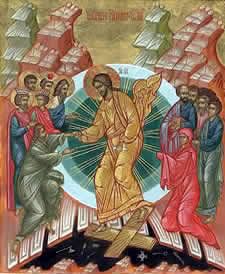 Since the second century there has always been a controversy in the Christian church regarding the date of Easter. Some Christians wanted to celebrate Easter on the fourteenth day of Nisan (the first day of the full moon in the first month of spring). Others wanted to celebrate it on the Sunday after the fourteenth day of Nisan. The Council of Nicaea (325 AD, from where we get the "Nicene Creed"), decided that Easter would always fall on the Sunday after the first full moon of spring.
Since the second century there has always been a controversy in the Christian church regarding the date of Easter. Some Christians wanted to celebrate Easter on the fourteenth day of Nisan (the first day of the full moon in the first month of spring). Others wanted to celebrate it on the Sunday after the fourteenth day of Nisan. The Council of Nicaea (325 AD, from where we get the "Nicene Creed"), decided that Easter would always fall on the Sunday after the first full moon of spring.But the controversy was not over, since there wasn't a common agreement about when spring (the vernal equinox) began. In addition, some churches also wanted to acknowledge the Jewish calendar, especially its celebration of passover, by assigning Easter to the Sunday after passover. And even here, there were also discrepancies within the Jewish calendar.
But that's just the beginning! Pope Gregory XIII in 1578 introduced a reform of the Julian Calendar which had somehow added ten days to the year (an issue too complicated for me to explain, but you can read more about it here). This new Gregorian Calendar, which is still used today, was adopted by most of the Christian churches. However, many churches that had over the centuries broken ties with the Bishop of Rome for differences in theology, spirituality, and practice (a break solidified in 1054 with the excommunication of the Patriarch of Constantinople by the Bishop of Rome), continued to use the Julian Calendar.
That's where we stand today. The Orthodox Churches (in Greece, Russia, Rumania, Bulgaria, Albania and Cyprus) who still use the Julian Calendar will celebrate Easter this year on Sunday, May 1, 2005. Over the last century, there has been increased efforts to find a common calculation for the date of Easter. (Discussion at Vatican II even proposed a fixed date.) The late Pope John Paul II made some bold steps toward dialogue with our Orthodox brothers and sisters. As the Orthodox Church celebrates Easter this weekend, let us also pray for further reconciliation among all Christians.
Click here for a very simple "Tale of Two Easters."
Sixth Sunday of Easter - May 1, 2005
Suggested Intercession
Click here for readings.
For the Orthodox Church as they celebrate Easter,
for days of abundant joy and feasting,
for deepening faith revealing the presence of the divine,
for the wisdom of the Holy Spirit
to lead all Christians to reconciliation and unity.
We pray to the Lord.
FILED UNDER: INTERCESSIONS